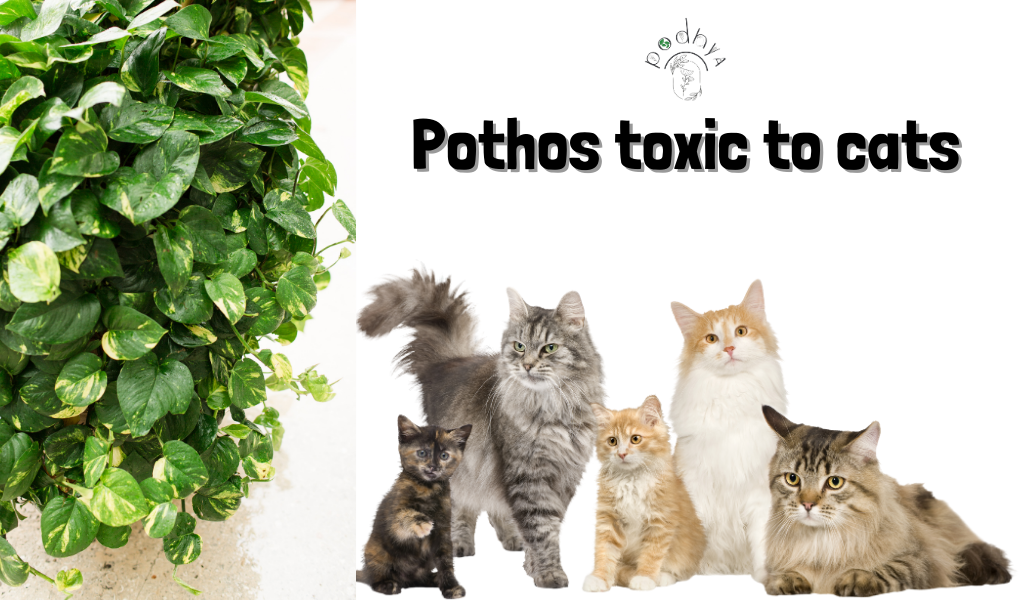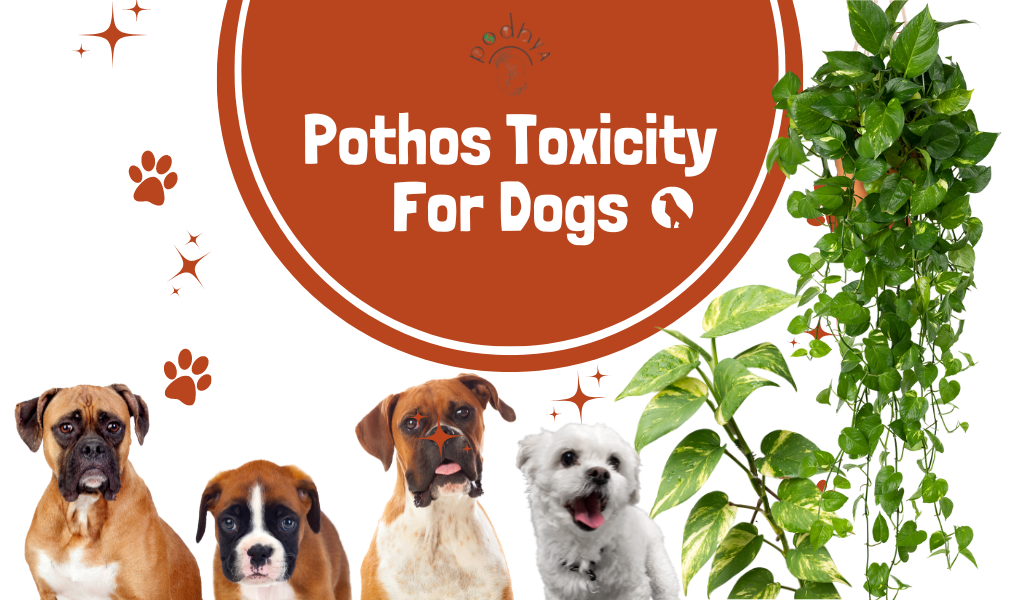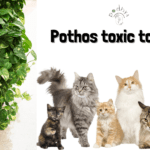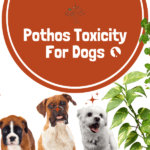Discover the truth about pothos and your furry friends! Learn how harmful this trendy houseplant can be to your pets or How Harmful is Pothos for Pets? Keep your pets safe and happy!

Pothos plants, also known as Devil’s Ivy, are popular for indoor and outdoor gardening due to their ease of care and attractive foliage. However, while pothos plants are non-toxic to humans, they can be toxic to cats and dogs if ingested. Here are some key points to keep in mind when considering a pothos plant for a home with pets:
- Pothos contain calcium oxalate crystals, which can cause irritation and swelling if pets ingest them.
- Symptoms of pothos toxicity in pets can include vomiting, drooling, difficulty swallowing, and oral irritation.
- In severe cases, pothos toxicity can lead to renal failure, although this is rare.
- If you have pets in your home, it’s essential to keep your pothos plants out of reach by hanging them or placing them in a location where your pets cannot access them.
- If you suspect that your pet has ingested pothos or any other plant, it’s important to contact your veterinarian immediately.
While this plant can add beauty and interest to a home, it’s crucial to be aware of its potential toxicity to pets. By taking appropriate precautions and keeping a close eye on your pets, you can enjoy the benefits of pothos without putting your furry friends at risk.
Also Read: Cebu Blue Pothos: The Ultimate Guide to Growing and Caring
Here’s what you need to know about pothos for pets:
How poisonous is pothos to cats?

Pothos is considered toxic to cats if ingested. It contains insoluble calcium oxalate crystals, which can cause oral irritation and swelling, vomiting, and difficulty swallowing. In severe cases, it can lead to kidney failure.
What happens if a dog eats a pothos plant?

Dogs can also be affected by pothos toxicity if they ingest the plant. Symptoms can include vomiting, diarrhea, oral irritation, and swelling, lethargy, and a loss of appetite. Like in cats, severe cases can lead to kidney failure.
How do I keep pothos off my cat?
To keep pothos plants off your cat, few things you can do:
- Keep pothos plants out of reach by hanging them or placing them in a location where your cat cannot access them.
- Train your cat to avoid houseplants and supervise them when they are near plants.
- Consider alternative pet-friendly plants if you have pets in your home.
It’s important to act fast if you suspect your cat or dog has ingested pothos. Contact your veterinarian or the Poison Control Hotline immediately for guidance and support. Treatment may include inducing vomiting, administering activated charcoal, and providing supportive care to manage symptoms. Being aware of the risks and taking preventive measures can help keep your pets safe from pothos toxicity.
Pothos plants are a popular houseplant, but they are toxic to cats and dogs if ingested. If you suspect your pet has eaten pothos, it’s important to act quickly to minimize potential harm. Here’s what to look out for and what to do:
Symptoms of pothos poisoning in pets:
- Vomiting and diarrhea
- Excessive drooling
- Oral irritation and swelling
- Difficulty swallowing
- Lethargy and depression
- Loss of appetite
What to do if your pet eats pothos:
- Remove your pet from the area to prevent further ingestion.
- Check your pet’s mouth for any remaining plant material.
- Call your veterinarian or pet poison control hotline immediately. They can guide you through the next steps, including possible treatment options.
- If recommended, bring your pet to the veterinarian for evaluation and treatment.
Treatment for pothos toxicity in pets may include:

- Inducing vomiting to remove any remaining plant material.
- Administering activated charcoal to prevent further absorption of toxins in the stomach.
- IV fluids to maintain hydration and promote the elimination of the toxin from the body.
- Medications to manage symptoms, such as anti-nausea drugs or pain medication.
Preventing pothos poisoning in pets:
- Keep pothos plants out of reach of pets by hanging them or placing them in a location where your pets cannot access them.
- Train your pets to avoid houseplants and supervise them when they are near plants.
- Consider alternative pet-friendly plants if you have pets in your home.
Being aware of the symptoms and taking quick action if your pet eats pothos can help minimize the potential harm and ensure your pet’s safety. Remember to contact your veterinarian or pet poison control hotline for guidance and support in any emergency.
Safer Plants for Pets
If you’re concerned about your pet’s safety, you may want to consider giving away your pothos and creating a gallery of non-toxic plants.
The ASPCA has created a comprehensive list of plants, categorized into toxic and non-toxic categories. Additionally, the University of California extension publication offers a detailed list of garden plants and their levels of toxicity.
FAQs
Is pothos safe for pets?
Pothos can cause oral irritation, vomiting, and difficulty swallowing in pets. It is not safe for pets to ingest.
How poisonous is Devil’s ivy?

Devil ivy is mild to moderately poisonous to pets and humans if ingested. It can cause oral irritation, vomiting, and difficulty swallowing. Contact a veterinarian or poison control center if you suspect your pet has eaten Devil’s ivy.
Is pothos poisonous to cats?

Yes, pothos is poisonous to cats. It can cause oral irritation, vomiting, and difficulty swallowing.
What if my dog eats pothos?
If your dog eats pothos, monitor them for signs of oral irritation, vomiting, or difficulty swallowing. Contact a veterinarian if symptoms occur.
Are pothos toxic to breathe?

Pothos can cause irritation to the eyes, nose, and throat if breathed in but is not considered toxic to breathe.
Dog ate pothos leaf
It’s best to contact a veterinarian if your dog has eaten a pothos leaf.
Cat ate pothos plant

If a cat eats pothos, monitor them for signs of oral irritation, vomiting, or difficulty swallowing. Contact a veterinarian if symptoms occur.
Are philodendron toxic to cats

Yes, philodendrons are toxic to cats. They can cause oral irritation, vomiting, and difficulty swallowing.
Cat ate pothos no symptoms
Even without symptoms, it’s best to contact a veterinarian if a cat has eaten pothos.
Dog ate one pothos leaf
If a dog ate one pothos leaf, monitor them for signs of oral irritation, vomiting, or difficulty swallowing. Contact a veterinarian if symptoms occur.
Is Devils Ivy toxic to dogs

Yes, Devils Ivy is toxic to dogs. It can cause oral irritation, vomiting, and difficulty swallowing.
- Tea Rotation Casino: Your own Gateway to High-end Playing Excellence
- Online Casino Zonder Limieten: Onbeperkt Plezier maken van Internet Gokentertainment
- Introduzione al Casinò Live: L’Esperienza Reale di 888 Casino
- Strategie avanzate per ottenere il massimo dai giochi di carte nel win casino
- Winbeast: Tu Lugar Premium destinado a Diversión de Casino en Línea
8 thoughts on “How harmful is pothos for pets?”